Volume 26 · Number 1 · Fall 2008
100 Ways
that UC Davis Has Transformed the World
Health and medicine
Serving while learning.
UC Davis professional students make a difference every day in the lives of Californians — providing medical care at five free clinics for underserved populations; legal representation for low-income people on civil rights, family law, prisoner rights and immigration law; and veterinary care for the pets of the homeless. In addition, management students offer consulting service to business, government and nonprofit organizations.
Education for all.
From helping to run an inner-city preschool to offering Mondavi Center matinees, UC Davis gives thousands of California schoolchildren a leg up on higher education. In addition, UC Davis partners with a college prep high school in West Sacramento to help ensure that underserved kids get the right preparation for college, and the UC Davis Health System offers several programs to help prepare underrepresented students for careers in the health professions.

Science of food.
For generations, UC Davis has brought the world new and improved foods, including fruit cocktail, fruit nectars and bottled prune juice that were developed by William Cruess, considered to be one of the fathers of modern food science and technology, and his colleagues. In 1925, department scientists were the first to discover how to freeze orange juice. UC Davis food scientists pioneered the study of how fatty substances called lipids oxidize in food and human tissue, raising the risk of cardiovascular disease, and how certain plant-based foods work as “antioxidants” to counteract that process. Researchers also developed magnetic resonance imaging techniques to detect food defects and improve food processing, as well as edible packaging films made from milk proteins to protect nuts from rancidity and fresh-cut fruits and vegetables from moisture loss and discoloration.

Maternal nutrition.
UC Davis has played a key role in the understanding of maternal nutrition and breastfeeding. Research has linked dietary deficiencies in pregnant mothers — the lack of zinc and manganese — with birth defects in infants. On breastfeeding, nutrition professor Kathryn Dewey established new standards to help parents, doctors, policymakers and child advocates better evaluate when nutrition and health care needs of children are not being met. Other research has focused on optimal conditions for storing donor milk to be given later to sick or preterm infants.
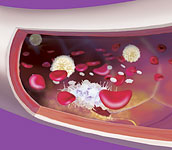
Freeze-dried Rx.
A longer shelf-life for blood platelets, which clot blood and help cuts heal, is one result of research on ways to freeze-dry living cells so that later they can be reconstituted with water — or even applied as a powder directly to wounds and bandages to promote skin repair. UC Davis cryobiology discoveries are also used in preserving certain medicines.
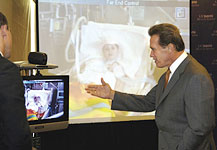
Connecting every corner.
Doctors and patients in rural areas of the state have access to immediate specialized care thanks to a UC Davis “telemedicine” program that uses high-speed data lines and video units to provide live interactive consultation with specialists at the UC Davis Medical Center. And now UC Davis telemedicine experts are working with the Federal Communications Commission, California Gov. Arnold Schwarzenegger and state agencies to develop the California Telehealth Network to expand the connection, linking more than 300 rural clinics and hospitals with specialty providers at academic medical centers and other nonprofit and for-profit health providers statewide.
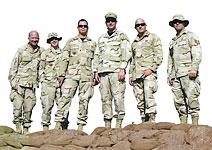
Trauma rescue.
Military surgeons in Iraq and trauma centers across the nation are saving many lives using techniques pioneered by UC Davis trauma surgeons. A UC Davis system of organizing trauma resuscitation allows patients to be quickly stabilized so they survive long enough to be treated.
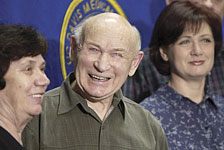
Let there be sight.
People blind from damaged corneas had their vision restored with techniques developed at UC Davis, including the implant of artificial corneas and lenses and a new bioengineering technique in which replacement corneal tissue is grown in a laboratory dish.

Gun violence.
Lawmakers have implemented California and federal laws restricting sales of assault weapons and improved strategies to prevent gun trafficking by using plenty of hard scientific data developed by UC Davis on the nature of gun violence.
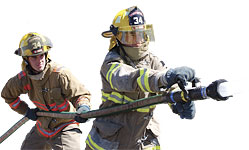
Clothing advances.
Flames and germs are no match for textiles and clothing from UC Davis, where scientists developed safer and more comfortable firefighting gear, and antibacterial garb for medical personnel, agricultural workers and soldiers.
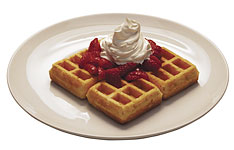
Epidemic of abundance.
A greater understanding of obesity, the unfortunate companion of a prosperous but increasingly sedentary society, has been the result of research in the nutrition department, public health sciences and School of Medicine. Campus researchers have studied the effects of obesity on longevity and kidney disease, dietary supplements for weight control, obesity treatment, the role of exercise and weight-related public-health policy. Other campus programs have focused on helping immigrants develop healthy nutritional habits as they adapt to a new food culture. And at the UC Davis Children’s Hospital, a pediatric endocrinologist developed innovative weight-management programs for children and adolescents.
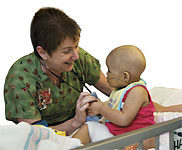
Nursing leaders.
A $100-million grant from the Gordon and Betty Moore Foundation is creating a new kind of nursing school where graduates will learn, discover and share new ways to improve patients’ lives and transform the nation’s health-care system.
Sensory science.
With the classic textbook Principles of Sensory Evaluation of Foods (1965), UC Davis faculty gave companies worldwide the scientific tools that enable more informed decisions in product development and quality control. Today UC Davis boasts more faculty associated with sensory science than any other U.S. university. Their contributions include the Wine Aroma Wheel, which lays out a common language for wine evaluation, and research linking some taste sensations — like those from sparkling wine or chili peppers — to pain.
New insights into Disease.
Grandfathers of the children with fragile X syndrome, who were suffering various degrees of dementia and tremors, now know they may have a previously unidentified progressive neurodegenerative disorder discovered by a UC Davis M.I.N.D. Institute research team.
Tailored modifications.
In the future, your doctor will look at your DNA profile before prescribing medicines and diets tailored specifically to your genes, thanks to work being done today at the Center of Excellence in Nutritional Genomics, led by UC Davis, the Children’s Hospital Oakland Research Institute and other partners.
Safe playgrounds.
UC Davis research helped to guide the safety standards adopted by the U.S. Consumer Product Safety Commission in 1981. Play equipment must be sized according to age, have rounded edges, guardrails and soft sand underneath.
Safeguarding your food.
Since the early 1900s, UC Davis and the field of food safety have grown up together. Today campus researchers from a variety of disciplines are conducting research, training students and informing the public about myriad food-safety challenges. UC Davis veterinarians help the California dairy industry prevent and detect microbial, anti-biotic and chemical contamination. Food, plant and veterinary researchers also have teamed up to better understand how a harmful strain of E. coli bacteria infected fresh spinach in 2007 and to prevent similar future contaminations. UC Davis researchers are also working with government and industry leaders to safeguard the state’s and nation’s food supplies against accidental or intentional contamination.
Reaching the underserved.
Hmong immigrants are overcoming fears and traditional beliefs that have prevented many from getting regular cancer screenings, recognizing early cancer symptoms and undergoing effective treatment, when needed, through a culturally relevant outreach effort developed by UC Davis and local Hmong leaders.
Mental health.
UC Davis psychologists have increased understanding about mental health issues faced by Asian Americans and helped therapists learn to deal more effectively with cultural differences and ethnic populations.
The war on pain.
Soldiers, veterans and others who are in pain may find being treated for their suffering will become easier under new laws being considered by Congress, the result of groundwork laid by UC Davis pain experts. Their work also led California to become the first state in the nation to require every one of its physicians to complete additional education in how to best treat patients with pain and to revamp its prescription-monitoring program.
Bird flu.
When word of a deadly bird flu outbreak began circulating in late 2003, leading to fears of a pandemic and panicking citizenry, a team of UC Davis experts kept the public and veterinary professionals informed about H5N1 and its potential to spread to the human population. A wildlife health expert and a poultry veterinarian, along with two UC Davis physicians, devoted time to informing print and television media and developed a “Flu School” curriculum to update veterinarians, health officials and the general public in both the United States and abroad on avian influenza.
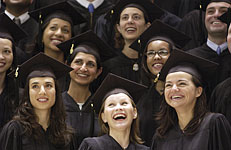
A world of alumni.
From the time the first students graduated in 1911, UC Davis alumni have been making their mark in the world — and beyond. Among their countless achievements are winning Olympic gold medals, directing Oscar-winning Disney films, heading UNICEF and flying through space as astronauts. With every year, the Aggie impact multiplies. From nine students in the 1911 class, our living alumni total has grown to 185,000.
« Return to 100 ways introduction

